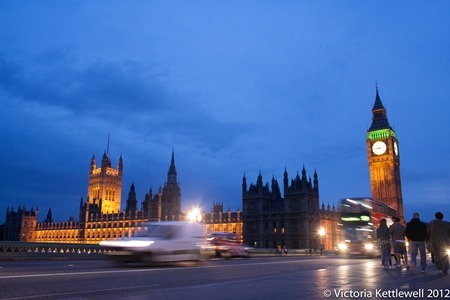
Photo © 2012 Dave Radcliffe
Recent conversations between the Liberal Democrat’s Nick Clegg and the Labour Party’s Ed Balls, alongside a very strange two-worded tweet by the Deputy Prime Minister, have led to increased speculation by the media of a coalition pact between the two parties. But with Labour seemingly set to easily achieve a majority in the House of Commons in 2015, is this a meaningless conversation?
The “friendly conversation” between the two senior politicians is causing a strange ripple of excitement across the political sphere yet it seems a strange conversation to have taken place. Reminiscent of the conversations that took place between Tony Blair and Paddy Ashdown in the run-up to the 1997 election, such a Lib-Lab pact seems unlikely to occur in the near future. With most polls predicting a comfortable majority for the official opposition, Miliband and Balls need not look to the Liberal Democrats to ensure that they are in Government from May 2015. Considering current predictions that the Liberal Democrats will struggle to achieve much more than 20 seats, having such a pact seems completely worthless and would not add much.
It would seem to suggest that Ed Balls is worried that the party might not achieve a majority or that internal factions within the Labour Party threaten their prospective Government’s power over Parliament. It would not be the first time, after all, that a Labour government has been defeated in Parliament due to differences within its own party – remember how Tony Blair lost the vote that would enable the detention of terror suspects for 90 days. With the recent return to the left of the political spectrum, some of the decisions Miliband’s government may wish to enact may not sit well with his own party, but may do so with a left-leaning Liberal Democrat party.
However, Nick Clegg has denied the relevance of this conversation, stating that it was just two parliamentary colleagues conversing amicably. Although his strange tweet of “Ed Balls”, confirmed genuine by his press office, and the reply by the Labour shadow minister seems to suggest more. Perhaps it is out of worry that a deeper rift may form between the two current coalition partners. However, with the Liberal Democrats suffering a massive reduction in membership, with left-leaning members leaving the party to join Labour or the Greens, and right-leaning members leaving to join UKIP, this could be an underhand attempt by the party leader to realign the party with a more socially focused Labour Party. With the Liberal Democrats looking to survive their first term in Parliament since almost a century ago, their need to be on friendly terms with Governmental parties is crucial.
Perhaps it is simply a friendly attempt to redefine the relationship between the two parties. With Labour constantly attacking the Liberal Democrats’ role within the coalition, this is understandable. In the unlikely situation that the Labour party do not return a majority in 2015, a good relationship with the Liberal Democrats is beneficial (although far from essential, as this coalition seems to show). Additionally, if the Labour Party do secure a majority, this may not be repeated at the 2020 election and a coalition with the Liberal Democrats may be necessary then.
What is blindingly obvious now, however, is the Labour Party’s willingness to accept the likelihood of coalitions in the future. With the power and support of the two main parties diminishing, it is increasingly possible that the Liberal Democrats will be a party of Government. Despite their poor reputation for their activity within the current coalition, their twenty or so MPs may be the MPs that allow for a majority Government. Furthermore, if the increased membership of UKIP does indeed translate into representation within the House of Commons, the Liberal Democrats will almost definitely be invited into coalitions in order to keep the far-right party away from governance, as the share of the vote is stolen from Labour and the Conservatives.
This conversation between Nick Clegg and Ed Balls is an obvious indication that a relationship between the two parties is on the horizon, even if it is not necessary in 2015.

